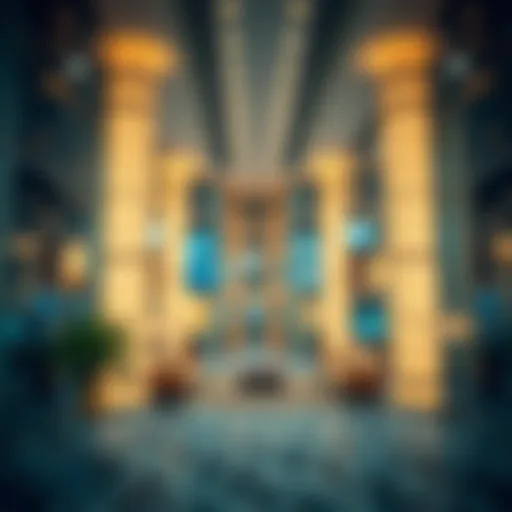Exploring the 2024 Ramadan Holiday in the UAE


Intro
The 2024 Ramadan holiday in the United Arab Emirates is set to be a time of reflection, fasting, and communal bonding. Amid the baked deserts and bustling streets, this month presents a unique tapestry of cultural practices that resonate through the fabric of Emirati society. Individuals from varied backgrounds unite to observe this significant month, making it one of the most notable times in the UAE. With evolving traditions and rituals, Ramadan in the Emirates is not just a spiritual journey but also a period that influences the economic landscape, particularly within the real estate sector.
This guide aims to unravel the multiple dimensions of Ramadan's significance and observance in the UAE. It draws attention not only to its historical roots and the local customs surrounding it but also to how this holy month serves as a catalyst for key market dynamics.
As expatriates, investors, and developers zero in on the region, understanding Ramadan’s multifaceted influence is crucial. By looking at cultural practices, changes in consumer behavior, and the impact on real estate, we can appreciate how this time shapes life in the UAE.
Let’s delve into these insights more deeply, shedding light on the relationship between Ramadan and its influence on cultural norms, traditions, and market trends within the United Arab Emirates.
Historical Context of Ramadan in the UAE
Understanding the historical context of Ramadan in the UAE provides a foundational insight into the culture, customs, and societal norms observed during this holy month. This article aims to shed light on the significance of Ramadan, tracing its origins and connectivity to Islamic tradition. This exploration enriches not only the personal experiences of the faithful but also reflects on how Ramadan influences larger socio-economic dynamics in the region.
The Origin of Ramadan
The roots of Ramadan trace back over a millennium to the time of the Prophet Muhammad, who was believed to have received revelations from Allah during this month. The period marks the ninth month of the Islamic lunar calendar, and for Muslims, it entails fasting from dawn until sunset—not merely abstaining from food and drink, but also from negative actions such as gossip or anger.
In the UAE, Ramadan's inception holds deep cultural significance. Initially, local customs integrated Islamic practices with traditional Emirati values, creating a unique blend. The call for prayer, which announces the beginning and end of the fast, echoes across the streets, reminding people of their spiritual obligations.
"Fasting is not simply about abstaining; it’s a means of fostering discipline and empathy toward those less fortunate."
Ramadan in Islamic Tradition
Ramadan is not only a month of fasting but essentially a time for self-examination and spiritual growth. Traditions vary across the Muslim world but often emphasize community bonding and familial ties. In the UAE, these traditions intertwine with local practices, enriching the cultural fabric.
The communal aspect is evident in the tradition of breaking fast, known as Iftar. Families, friends, and neighbors come together to share meals as a way to reinforce their relationships and express solidarity. Mosques become centers of activity, offering communal prayers and meals during this time.
Moreover, acts of charity and generosity, or Zakat, are especially emphasized during Ramadan. People tend to donate more to charitable causes, helping to strengthen community ties and ensure that those in need are remembered. This charity resonates profoundly with the spirit of Ramadan, which teaches the importance of caring for one another and standing in solidarity.
In summation, the historical context of Ramadan in the UAE is deeply woven into the identity of its people, serving as a reminder of their faith, compassion, and commitment to community—not just during the holy month, but throughout the year.
Cultural Significance of Ramadan
Ramadan holds profound cultural importance beyond its religious context in the UAE. It is a period that fosters community spirit, enhances social connections, and promotes generosity amongst individuals, thus enriching the cultural fabric of the society.
Community Engagement and Charity
During Ramadan, the act of giving takes center stage. This month encourages individuals to extend their hands to those less fortunate. Here’s how these acts manifest:
- Zakat: A mandatory form of almsgiving, Muslims are obliged to donate a portion of their wealth to support community welfare. This creates a sense of responsibility towards fellow community members.
- Iftar Meals: Many families and organizations sponsor Iftar traditions. It's common to see free meals offered at mosques or community centers, where everyone is welcomed, whether they are family, friends, or strangers.
- Volunteerism: Numerous initiatives invite individuals to volunteer, helping distribute food to those in need. This showcases a broader sense of unity and compassion, pulling communities together.
Some community programs even take innovative approaches by utilizing social media platforms to raise awareness on charitable causes, encouraging residents to contribute. It fosters a sense of pride; being part of a community that values altruism.
"In the Middle East, charity during Ramadan isn’t just about giving money, it’s about giving time, love, and comfort to those around us."
Family and Social Bonds
Ramadan serves as a catalyst for strengthening family and social ties, emphasizing shared experiences and collective values. The communal aspect is engaging:
- Iftar Gatherings: Families gather to break their fast together each evening, with meals often comprising traditional dishes that reflect cultural heritage. These gatherings serve not only to nourish the body but also to revive relationships.
- Intergenerational Activities: Elderly family members often share stories or teachings about Ramadan’s significance, helping to pass down traditions and enrich the youth's understanding. This bond shared among various ages enhances cultural continuity.
- Community Visits: It's not just about one’s immediate family; it’s common practice for neighbors to exchange visits during Ramadan. Such visits reinforce neighborhood unity and create a stronger sense of belonging.


In essence, the experiences during Ramadan foster conversations that dilate into deeper understanding and respect among individuals from diverse backgrounds. The mixing of cultures during gatherings contributes to a richer tapestry of shared human experience.
Through fostering community bonds and celebrating familial ties, Ramadan transforms from a month of fasting into a period of connection that reinforces the essence of being human in a thriving society.
Observances and Rituals
The observances and rituals during Ramadan in the UAE are profound, weaving together the fabric of community, spirituality, and cultural identity. This period is not just about abstaining from food and drink; it’s a tapestry of practices that draw people closer to their faith and to one another. From the sunrise to sunset, individuals engage in various activities that morph daily life into a sacred observance, allowing participants to reflect on their personal beliefs while fostering community spirit.
Fasting Practices
Fasting during Ramadan, or Sawm, is one of the Five Pillars of Islam and carries deep significance. Muslims across the UAE rise before dawn for Suhoor, a pre-dawn meal that prepares them for the day ahead. This meal is crucial; it’s not merely about eating but about filling the spirit with strength and readiness. As the sun sets, the fast is broken with Iftar, often begun with a date and water, following the tradition of the Prophet Muhammad.
The act of fasting extends beyond physical hunger; it urges participants to practice self-control and empathy for those less fortunate. Many find that this practice contributes to a sense of community as individuals gather for meals and engage in collective prayers. Overall, fasting paves the way for increased piety, making it a time for family and friends to unite in shared experiences.
Iftar and Suhoor Traditions
The traditions surrounding Iftar and Suhoor highlight the deep-rooted social and cultural practices within Emirati society. Iftar is more than just a meal; it is an event. Families and friends often come together to break their fast, with diverse dishes ranging from Arabic kebabs to rich local sweets like Baklava. Hotels and restaurants in the UAE showcase an impressive array of themed Iftar menus, catering to various tastes and dietary preferences. This period sees a flourish in culinary creativity that attracts not just locals but also expatriates seeking to join in the communal spirit.
Suhoor, while often intimate, has its own charm. Many prefer to enjoy a quiet meal at home, but some restaurants offer Suhoor buffets, allowing both locals and expatriates to celebrate with others. These meals usually consist of nutritious ingredients ensuring energy for the day ahead. The camaraderie experienced during these meals is palpable, reinforcing social connections and nurturing bonds.
Prayer and Spiritual Reflection
Prayer during Ramadan is vital; it serves as a means to deepen one’s relationship with God. Muslims are encouraged to perform additional prayers, known as Tarawih, in the nights following Iftar. Many mosques throughout the UAE come alive during these hours, filled with worshippers praying in unison. This not only reinforces community ties but also provides a space for spiritual growth. The special ambiance—dim lights and the sound of sincere supplications—creates an atmosphere that encourages reflection and peace.
As folks engage in personal prayers, they often find the time for introspection. It is common for individuals to seek forgiveness, express gratitude, and make resolutions for personal growth. This enhanced spirituality goes a long way in shaping the character and attitudes of participants, creating a ripple effect far beyond the month itself.
During Ramadan, the UAE transforms into a haven of unity and peace, where each ritual serves to strengthen bonds, both spiritual and social.
As the month unfolds, these practices of fasting, communal meals, and prayers become a beacon that illuminates the path for many, reinforcing a collective sense of identity and purpose.
Ramadan Dates in the UAE
Understanding the specific dates for Ramadan in the UAE is crucial for both residents and visitors. The month-long observance, marked by fasting and reflection, has profound implications for how daily life is structured in the region. For those involved in investment, real estate, or hospitality sectors, being aware of the festival's timeline can help in strategizing business operations, marketing efforts, and enhancing customer engagement. Whether you’re a developer keen on launching projects or an expatriate looking to integrate better into the local culture, knowing the Ramadan calendar is critical.
Expected Start and End Dates
In 2024, Ramadan is expected to commence on the evening of Sunday, March 10, and conclude on the evening of Tuesday, April 9. The dates are subject to moon sightings and can vary slightly across different locations in the UAE. This variability can lead to uncertainty, making it important for businesses and institutions to stay flexible and prepared to adapt their schedules accordingly.
The significance of these dates stretches beyond just religious observance. For instance, local businesses might adjust their operating hours to align with community norms where daytime work is less productive due to fasting. Evening hours can see a bustling atmosphere filled with Iftar gatherings, creating a unique opportunity for retailers and hospitality venues to cater to the increased foot traffic.
Eid al-Fitr Celebrations
The month of Ramadan concludes with Eid al-Fitr, a celebration of breaking the fast. In 2024, Eid is projected to be observed on Wednesday, April 10; however, just like Ramadan, the exact date will depend on moon sightings. This festival is more than just a holiday; it’s a pivotal period for community bonding and gratitude.
During Eid al-Fitr, one can expect festivities across the UAE, with large pray gatherings in mosques and public spaces, and vibrant celebrations that include feasting, family gatherings, and gift-giving. For investors in the tourism and retail sectors, this period often reaps significant spikes in business activity. People often shop for new clothes, gifts, and food items, which presents numerous opportunities for businesses that can strategically market their offerings leading up to and during the festivities.
"Eid al-Fitr isn’t just a day off; it’s a chance to reconnect with family and friends, marking an end to a month of sacrifice and spiritual growth."
In summary, understanding the Ramadan dates and the subsequent celebrations is essential for anyone looking to navigate life in the UAE during this time. It informs necessary adjustment in day-to-day activities, opens discussions for community engagement, and provides a clear path for business strategies, ensuring smooth operations amidst the unique rhythm of Ramadan.
Impact of Ramadan on Daily Life
The month of Ramadan holds immense importance in the United Arab Emirates, shaping not just spiritual reflections but also affecting daily life in remarkable ways. As the country embraces the essence of this month, various aspects of personal and professional life undergo significant transformations. Understanding these effects can prove beneficial for expatriates, investors, and local residents alike, giving insight into the rhythms of life during this holy period.


Changes in Work Schedules
During Ramadan, companies across the UAE often adjust their operating hours to accommodate the fasting schedule. A common practice is to shorten the workday, allowing employees more time to prepare for Iftar, the meal that breaks the daily fast at sunset. For instance, while a standard workday might span eight hours, many establishments shift to a six-hour day. This adjustment not only recognizes the physical demands of fasting but also fosters a more supportive work environment.
Moreover, some organizations offer flexible hours, permitting employees to start and end their days earlier or later, depending on their preferences and commitments. This flexibility enables staff to manage both their professional responsibilities and their personal observances more effectively.
It’s also crucial to note that clients and partners may also expect a level of understanding if meetings or deadlines shift during Ramadan. The result is a work atmosphere that values community, respect, and the essence of the month itself.
Availability of Services and Products
The changes in daily life reach beyond the workplace; they affect the overall availability of services and products throughout the month. Retailers and service providers tend to modify their hours to align better with fasting schedules. Many stores may open later in the day and extend their hours during the evening, particularly leading up to Iftar.
Furthermore, restaurants shift their focus to cater to the demand for Iftar meals. Typically, these establishments offer special menus designed for breaking the fast, which can include everything from traditional foods to modern culinary twists. This high demand creates opportunities for caterers to flourish, as many families and businesses look to host Iftar gatherings.
It’s essential for both locals and visitors to account for potential delays or limited services during daytime hours. Restaurants, retail shops, and even healthcare facilities may operate differently, which can impact daily routines.
"Understanding the flow of Ramadan is vital for everyone in the UAE. Adaptability ensures that both residents and expatriates fully engage with the spirit of the month."
Consequently, the influence of Ramadan also stirs conversations about balance. People tend to forge stronger ties with family and friends, often coming together over Iftar. This collective experience not only enriches personal relationships but also promotes a deeper sense of community.
In summary, as Ramadan unfolds, the UAE transforms into a landscape of patience, reflection, and togetherness. Everyone, from investors to homebuyers, should be keen on these dynamics to better fathom how Ramadan affects life in the Emirates.
Ramadan and the Real Estate Market
Ramadan is not merely a month of fasting and spiritual reflection; it also plays a significant role in shaping various sectors in the UAE, particularly real estate. For investors and homebuyers, the dynamics of the market during this period can offer unique opportunities and challenges. Understanding how Ramadan impacts property trends and consumer behavior becomes vital for anyone engaged in the market.
Trends in Property Investment
During Ramadan, there is often a noticeable shift in property investment trends. Typically, potential buyers become more contemplative and holistic in their approach to purchasing property. This can lead to a spike in serious inquiries as individuals reflect on their long-term housing needs amid the spirit of giving and family gatherings.
- Increased Inquiries: The number of inquiries from expatriates looking to secure a home or investment in the UAE tends to rise, as many contemplate their housing stability during this month of reflection.
- Focus on Family Homes: Given that Ramadan is a time for family, the preference for larger units or villas increases, particularly in suburban areas. Investors may find that properties situated near mosques or community centers can garner more interest, given their accessibility for Ramadan-related activities.
"Inquiring minds often make wise investments; Ramadan can shift priorities to long-term living solutions."
Market Dynamics During Ramadan
The market dynamics in the real estate sector during Ramadan are shaped by specific behavioral patterns observed among buyers and sellers. This month fosters a sense of community and generosity, sometimes shifting focus away from transactions to more personal interactions and relationships.
- Slower Transactions: While inquiries may increase, the pace of actual transactions can slow down. Many consumers prefer to postpone significant decisions until after the holiday, leading to a dip in sales volume.
- Exclusive Ramadan Offers: Real estate developers and agencies often introduce Ramadan-specific incentives. Limited-time offers, such as waiving certain fees or providing attractive payment plans, can be quite appealing to potential buyers during this month.
Effects on Rental Market
The rental market also feels the impact of Ramadan. Many expatriates and residents assess their living situations with fresh eyes as they consider family needs. The following trends are often observed:
- Short-term Rental Demand: There’s typically a brief surge in demand for short-term rentals as families host friends and relatives for Iftar gatherings. Properties that cater to large groups may see higher occupancy rates.
- Price Adjustments: Landlords may take this opportunity to adjust rental prices in anticipation of incoming visitors or families, appealing to those looking for housing during Ramadan.
- Stability in Rental Rates: On the flip side, some landlords choose to maintain stable rental rates during Ramadan, recognizing that prolonged family gatherings in homes can lead to potential long-term lease opportunities.
Understanding Ramadan’s impact on the real estate market can equip investors, homebuyers, and developers with the insights needed to navigate this unique period effectively. By recognizing trends in property investment, market dynamics, and rental behaviors, stakeholders can make informed choices that cater to both their immediate needs and long-term strategies.
Dining and Hospitality During Ramadan
Dining and hospitality during Ramadan hold a significant place in the cultural fabric of the UAE. As the month-long observance unfolds, it transforms not just the routines of daily life but also the culinary landscape of the nation. For both local residents and visitors, this period is marked by rich traditions and flavors, providing an opportunity to connect with others over shared meals and communal experiences.


Restaurants and Iftar Offers
When the sun sets, the city comes alive as the call to prayer resonates across the skyline. This moment marks the beginning of Iftar, the evening meal that breaks the fast. Restaurants ramp up their efforts to cater to the influx of patrons seeking warm welcomes and delectable dishes. Many establishments offer special Iftar menus that showcase an array of traditional Emirati and international cuisine.
For instance, traditional dishes such as dates and lukaimat — sweet dumplings drizzled with date syrup — play an essential role on Iftar tables. Restaurants like Al Fanar and Bice Mare often draw in crowds with buffet spreads that feature Shorbat Adas (lentil soup) alongside grilled meats and aromatic rice dishes.
"Dining out during Iftar is not just about the food; it's about the experience of breaking bread with others in a special atmosphere."
These dining options extend beyond just food to include entertainment, cultural performances, and festive decorations that create an inviting ambience. Some upscale venues collaborate with local artists for live music, providing an engaging backdrop for the evening's feasting. Special offers and packages also become a regular feature, often appealing to families and groups, allowing them to indulge in a complete dining experience without breaking the bank.
As restaurants cater to this demand, they also need to consider dietary restrictions and preferences. While traditional dishes hold their place, many establishments now offer vegetarian and vegan options to ensure all guests feel included in the celebration. This adaptation reflects a wider trend in the UAE towards inclusivity in dining.
Catering Services for Events
As gatherings, family reunions, and community events abound during Ramadan, catering services see heightened demand. Many families prefer to host Iftar gatherings at home, inviting friends and relatives to share in meals together. Catering companies respond by providing tailored menus that can accommodate various preferences and dietary requirements.
Services such as Kitsch and Foodak offer flexible packages that include everything from traditional Arabic dishes to Western fare. These packages often come with delivery services, ensuring that hosts can focus on their guests rather than spending hours in the kitchen. This is especially relevant for expatriates who may wish to infuse their unique culinary backgrounds into their Iftar celebrations, blending local flavors with international influences.
The benefits of using catering services during Ramadan extend beyond the food itself. They can help create a beautiful presentation that enhances the dining experience. Offering items such as decorative platters for serving sweets or drinks not only elevates the meal but also aligns with the cultural appreciation of hospitality during this sacred month.
Tourism Considerations
The influence of Ramadan on tourism in the UAE is both profound and multifaceted. During this holy month, the atmosphere transforms, drawing visitors eager to engage with the unique cultural practices that flourish during Ramadan. This section sheds light on the intersection of tourism and Ramadan, detailing its significance for both travelers and the local economy.
Attraction of Cultural Tourism
Cultural tourism takes on a special tone during Ramadan in the UAE. This month serves as an opportunity for visitors to experience local customs and rituals firsthand. From the call to prayer echoing throughout the streets to the nightly communal meals known as Iftar, tourists are immersed in a vibrant cultural tapestry. This engagement with local tradition can be transformative, as many visitors return home with not only memories but a deeper appreciation for Islamic culture and values.
Moreover, events such as traditional markets or souks burst into life, emphasizing the rich heritage of the region. Activities like art exhibits, religious lectures, and performances enable travelers to interact with the community, fostering connections that transcend mere visitation. This cultural immersion usually results in a considerable boost to the tourism sector, benefiting restaurants, hotels, and various service providers.
"Experiencing Ramadan in the UAE is like stepping into a living history book that invites you to share in its pages."
Travel Tips During Ramadan
Traveling during Ramadan does require some understanding of local customs and expectations. Here are a few key considerations for tourists:
- Eating and Drinking: From dawn until sunset, Muslims fast. Therefore, it is advisable for tourists to refrain from eating or drinking in public places during these hours. Most establishments will respect this practice, with many restaurants opening only after sunset for Iftar.
- Adjusting to Hours: Approximately, businesses operate on reduced hours during Ramadan, especially during the day. Many shops and attractions might open later in the morning and close earlier in the evening, making it critical for tourists to plan accordingly.
- Respect for Traditions: Visitors are encouraged to dress modestly and observe a respectful demeanor when attending cultural events or mosques. Understanding and respecting social norms will enrich the travel experience.
- Explore Iftar: One of the highlights of visiting during Ramadan is experiencing the diverse Iftar feasts. Many hotels present lavish buffets, showcasing various cuisines. Booking in advance is recommended, especially for renowned venues.
Travelers can maximize their experience of Ramadan in the UAE by being mindful of these practices, ensuring a respectful and enriching visit. For additional resources on Ramadan tourism in the UAE, check out the official UAE tourism website: Visit Abu Dhabi.
In summary, the intertwining of tourism and Ramadan creates a unique opportunity for visitors to engage with the cultural essence of the UAE while simultaneously impacting the local economy positively.
End
As we reach the end of this comprehensive overview, it's crucial to reflect on the multifaceted significance of Ramadan in the UAE. This holy month transcends mere fasting; it embodies a rich tapestry of traditions, community engagement, and economic shifts that shape the lives of both Emiratis and expatriates. The celebration isn't just a month on the calendar; it’s a period that influences social dynamics, personal reflections, and even market trends, making it an essential topic of exploration.
The Lasting Impact of Ramadan in the UAE
Ramadan leaves an indelible mark on various aspects of life in the UAE. The spirit of giving, for instance, fosters a strong sense of community. Many individuals and businesses engage in charitable activities, offering meals to those in need. This communal spirit, evident through the numerous iftar gatherings, strengthens bonds among neighborhoods.
Furthermore, from a business perspective, Ramadan acts as a catalyst for certain sectors, particularly hospitality and retail. Restaurants, cafes, and malls implement Ramadan-specific offers, attracting both locals and tourists. This creates a vibrant atmosphere that not only enhances consumer experiences but also contributes significantly to the economy. In real estate, developers often tailor projects to accommodate traditional practices, ensuring spaces for family gatherings and community centers.
Looking Ahead to Future Celebrations
Anticipating future Ramadan celebrations, one can't help but consider how the observance will evolve in response to global shifts and local innovations. As the UAE continues to attract a diverse population, future Ramadan observances may become more inclusive, incorporating elements from various cultures while maintaining the core principles of the holy month.
Additionally, there’s potential for technological integration in Ramadan practices. The rise of apps facilitating iftars, donations, and community events can streamline participation and enhance engagement. Future celebrations could see a blend of tradition and modernity, ensuring that the essence of Ramadan is honored while catering to a tech-savvy audience.
Ultimately, Ramadan serves as a reminder of the values of compassion, resilience, and unity. By honoring its significance and recognizing its impact, stakeholders from investors to community leaders can appreciate the profound implications that this month holds for all individuals within the UAE.















